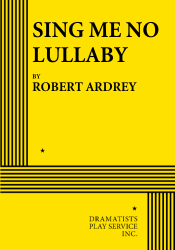THE STORY: As Brooks Atkinson of The New York Times tells it, “some Illinois college friends of 1938 who have a country reunion at Christmas of the present time. As students, most of them had what were known as progressive political ideas in 1938. One of them, a brilliant mathematician, placed his faith in Soviet Russia then. The Stalin-Hitler pact shook all that faith out of him in 1939. By the present time he is one of the dispossessed. Because of his college political associations, no one will employ him, no one will rent him an apartment, no one will associate with him, no one will clear him, no one will adjudicate his case. Mr. Ardrey doesn’t solve the problem. But the contribution he has made in the last act is a clear and perceptive statement of this nameless, formless situation and an estimation of what it is doing to America…Mr. Ardrey…is a man of principle and taste. In SING ME NO LULLABY he has performed the function of a writer. He has found the words to describe something that is vague and elusive but ominous. And he has got far enough away from political recriminations to state it in terms of character and the life of the spirit."
“…stirring…absorbing…[Ardrey] writes with directness, perception and power. The third act of SING ME NO LULLABY constitutes the most forceful statement anyone has made in the theatre for ages.” —The New York Times.
